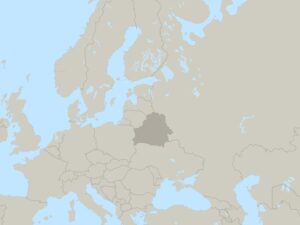Some 60,000 people joined an opposition rally in Belarus, where presidential candidate Svyatlana Tsikhanouskaya said she was “tired of being afraid” and wanted to bring about peaceful change in the country, RFE/RL reports. Tsikhanouskaya also dismissed the suggestions by investigators that her husband was connected to an alleged plot involving Russian mercenaries to destabilize Belarus ahead of the country’s August 9 presidential election.

Credit: HRW
The official media are playing up the alleged Russian plot as evidence that Moscow is waiting to strip Belarus of its independence if Lukashenko doesn’t win, according to Vladimir Kobets, executive director of the International Strategic Action Network for Security, and David J. Kramer, director of the European and Eurasian studies program at Florida International University.
That can’t be entirely discounted. Yet while Belarusans are well-advised to remain wary of the Kremlin, they should also keep in mind that their current dire condition is the result of Lukashenko’s incompetent and brutal leadership, they write for The Post:
It is Lukashenko, after all, who left the country vulnerable to Russian pressure and dependence, including when he signed a treaty in 1999 creating a “union state” with Russia. Lukashenko thought this treaty would ultimately enable him to become ruler of a united Belarus-Russia state. Instead, it remains the Kremlin’s main instrument for potentially bringing the country under Moscow’s direct control.
Europe’s last dictator is suddenly on shaky ground. What got him there? Coda Story asks. A crumbling economy, a recent crackdown on the opposition and, according to our sources on the ground, the fact that he didn’t take the pandemic seriously. Lukashenko dismissed the dangers of Covid-19, kept businesses open and urged his security services to investigate those spreading information about the virus that contradicted official narratives.
 Lukashenko was among the first authoritarians to perfect the art of “preempting” democracy, the late political scientist and former Reagan-Fascell fellow Vitali Silitski (right) wrote for the NED’s Journal of Democracy.
Lukashenko was among the first authoritarians to perfect the art of “preempting” democracy, the late political scientist and former Reagan-Fascell fellow Vitali Silitski (right) wrote for the NED’s Journal of Democracy.
In a free and fair election, Belarusans would likely vote for a change in leadership and a shift in their country’s orientation toward the West, Kobets and Kramer add. Neither Lukashenko nor Moscow wants that to happen. The stakes are high, and Western leaders should make clear that they stand for a free and fair process and with the people of Belarus, no matter what.
People are still coming. This must be the most massive political rally in Belarus history. pic.twitter.com/ah9JMA4U0H
— Franak Viačorka (@franakviacorka) July 30, 2020







